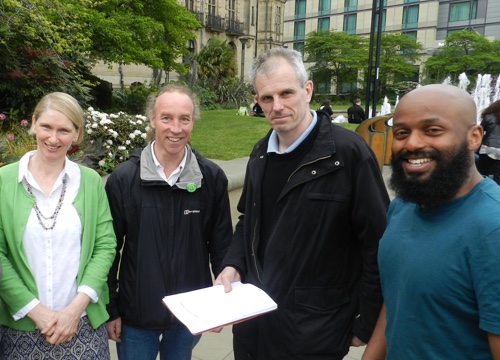July’s council meeting was the first ordinary full council meeting to be held since the big walk-out of opposition councillors in April. May’s meeting was the largely ceremonial AGM and June’s was cancelled because of the general election. This was the first under a new Lord Mayor – and of course a new Deputy Lord Mayor, Cllr Magid, Sheffield’s first Green in the position.

Green Councillors Alison Teal, Douglas Johnson, Rob Murphy and Magid
The new Lord Mayor set out her commitment to clamp down on disrespectful behaviour by members of both the council and the public. Standards of respect for each other’s views have been very much a part of the Green councillors’ campaign to clean up the quality of debate (Cllr Aodan Marken took a big lead on this) and we are pleased a working group is now looking at how to make council meetings more effective and more welcoming to the public.
A special item about the Grenfell Tower fire and the implications for Sheffield brought sympathy from all sides and gratitude to the people who have been directly affected. In Sheffield, staff have been checking all council-owned tower blocks and residents of Hanover have been affected by the major decision to remove the cladding urgently. We now know that the contractor had not fitted the solid aluminium panels the council had ordered but some composite made of a soft plastic interior. Outside council-owned buildings, there is even less certainty. In my speech, I questioned the effectiveness of the buildings standards framework in view of the fact that local authorities no longer have control over it. I reflected on the Chief Executive’s comment that he expected to have “a high level of trust in state regulation.” I think most people expect that and would be concerned to find out that a system that permits property developers to hire their own building inspectors independently may be far less rigorous check on building standards.
The Green amendment was to call for action, in the form of a specific report, to be brought back (and therefore made public) to a future council meeting. The amendment was passed successfully and will be presented to a Scrutiny committee for discussion.
There were a number of petitions and public questions but the petition for debate was a repeat of a previous petition of Anthony Cunningham calling for a night-shelter. There are problems with this. I pointed out that “homelessness” is not the same as the most visible impact of seeing vulnerable people begging, sleeping rough or problems linked to physical and mental health, substance abuse or violence.
People sleeping on the street are only a tiny fraction of the people who are homeless within the legal definition. And whilst I think we are right to be sceptical about the Administration’s statement that everyone sleeping rough has been offered temporary accommodation, the big issue is about the lack of long-term, patient, tolerant support. I pointed out that the Supporting People framework had been dismantled in the name of austerity, losing lots of local jobs and cutting a lot of people off from support when they really need it. Referring to people coming into Sheffield city centre from other towns, Anthony confirmed, “people are coming from other towns because of the cuts.”
However, for a night shelter to do more good than harm, it needs proper staffing. And if the money is available, it would be better spent on expanding existing services rather than trying to set up yet another new project.
The matter was referred back to the Cabinet Member.
Peaceful protests and democracy were not overlooked. Alison Teal spoke at a rally before the meeting. In public questions, Mark Banner asked how the council’s actions taking injunction proceedings against peaceful protestors protecting trees squared with its commemoration of the Kinder Scout mass trespass. In response to Nigel Slack’s question, Cllr Lodge informed the meeting that it was the protesters’ choice whether they suffered the consequences of the council’s actions. Nick Jordan asked whether the council was now a Thatcherite regime, referring to aggression he had been subjected to from Amey workers brought in from Birmingham and suggesting a link to Thatcher’s tactic of bringing in police from far outside South Yorkshire to crush the 1984 miners’ strike.
When it came to motions and amendments, we were surprised when Labour refused to extend their best wishes to Nasima Akther, Leigh Bramall and Nick Clegg for no longer being councillors and MP.
Still, at least the meeting ended without a big bust-up this time.
